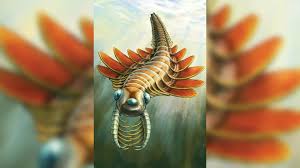Mosura fentoni : New extinct species

Scientists recently identified a new extinct species, Mosura fentoni, an early marine predator from around 506 million years ago during the Cambrian period.
- Mosura fentoni is a newly discovered Cambrian marine organism found in the Burgess Shale, a globally significant fossil site in British Columbia, Canada.
- It belongs to the group Radiodonta, which are extinct stem-group arthropods, distant relatives of modern insects, spiders, and crustaceans.
- Despite being a small-sized species (ranging from 5 to 6 cm), M. fentoni displays highly specialised anatomical adaptations.
- The body of Mosura fentoni is unusually elongated, with a division into three distinct zones comprising a total of 26 segments:
- A short neck region that supports the head,
- A mesotrunk consisting of six paddle-shaped flaps that function as propulsive organs for swimming,
- A posterotrunk containing up to 16 segments dominated by rows of fine gills.
- The posterotrunk is proposed to be a specialised breathing tagma, drawing parallels to the oxygen-collecting tails of modern horseshoe crabs, suggesting a highly evolved respiratory mechanism in this ancient organism.




